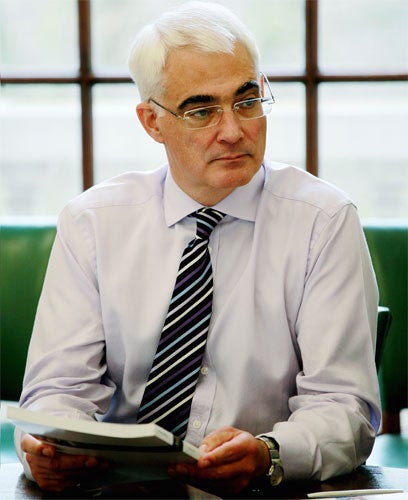Darling is forced to delay pension boost
Blow to Chancellor on day of pre-Budget report as poll shows businessmen remain gloomy on economy

Your support helps us to tell the story
From reproductive rights to climate change to Big Tech, The Independent is on the ground when the story is developing. Whether it's investigating the financials of Elon Musk's pro-Trump PAC or producing our latest documentary, 'The A Word', which shines a light on the American women fighting for reproductive rights, we know how important it is to parse out the facts from the messaging.
At such a critical moment in US history, we need reporters on the ground. Your donation allows us to keep sending journalists to speak to both sides of the story.
The Independent is trusted by Americans across the entire political spectrum. And unlike many other quality news outlets, we choose not to lock Americans out of our reporting and analysis with paywalls. We believe quality journalism should be available to everyone, paid for by those who can afford it.
Your support makes all the difference.Alistair Darling is to delay a flagship scheme to allow 11 million workers to have personal pensions as he announces spending cuts to protect budgets for schools, hospitals and the police.
In today's pre-Budget report, the Chancellor will postpone the plan for "personal pension accounts" aimed at ensuring low-paid workers not in a company scheme have an income in retirement on top of the basic state pension.
Under the proposal, employers would be forced to contribute to the personal accounts. They were recommended by an inquiry into pensions chaired by Lord Turner of Ecchinswell, and the Government promised to introduce them in 2012. The delay, initially for one year, will save the Treasury between £1bn and £2bn in tax relief on the pension contributions.
The move will be one of the "tough choices" spelled out by Mr Darling as he explains how the Government will safeguard "priority" frontline services while halving the £180bn deficit in public finances in four years. He will say that it would be wrong to start cutting in 2010-11 because the world economic outlook is so uncertain. So the squeeze in "non-priority" departments will bite in 2011-12.
The Chancellor will argue that government spending must be maintained next year to ensure the expected economic recovery does not fizzle out. The fragile state of the economy is underlined by a ComRes survey of 204 business leaders for The Independent.
The number of businessmen who detect signs of recovery in their sector has remained at 49 per cent for the past three months, after rising from 38 per cent in August. Only 44 per cent can now spot "green shoots", while 7per cent replied "don't know."
Mr Darling will not issue a detailed budget for each Whitehall department. A Treasury source said last night: "We are not fixing budgets now but people have the right to know which services we will prioritise and how we intend to pay for them. We are under no illusion that that will mean some tough choices – cutting unnecessary programmes and lower-priority budgets. But our public services start from a position of strength, with spending up 50 per cent in real terms since 1997 and investment this year at its highest level for 30 years."
Mr Darling, who will stick to his April Budget prediction that the economy will grow by between 1.25 and 1.5 per cent next year, will say that spending will grow much more slowly from 2011-12. Higher spending on tax credits and unemployment benefit in the recession will mean very tight budgets. Protecting schools, hospitals and the police will mean real cuts in other areas.
The spending squeeze will be one of four ways in which the Chancellor will pledge to halve the deficit. The others are a "go-for-growth" strategy, efficiency savings and some tax rises.
The Tories will demand that the spending cuts should start next year. David Cameron, the Tory leader, said yesterday the deficit was "like a dark cloud hanging over the country". He added: "You can't solve the problem of the deficit straight away but a credible plan is not only about tomorrow, it's also about what you start to do today. I don't think anyone is going to be impressed with a plan that doesn't have at least some early action in it."
The Tories' Office for Budget Responsibility will be set up in shadow form, under the leadership of the former Treasury adviser Sir Alan Budd, so it can publish forecasts ahead of the emergency Budget planned if the party wins the election.
George Osborne, the shadow Chancellor, said it would hold the Tories to account "for promises made to the British people". Sir Alan said it would "keep the Chancellor's feet to the fire".
Join our commenting forum
Join thought-provoking conversations, follow other Independent readers and see their replies
Comments